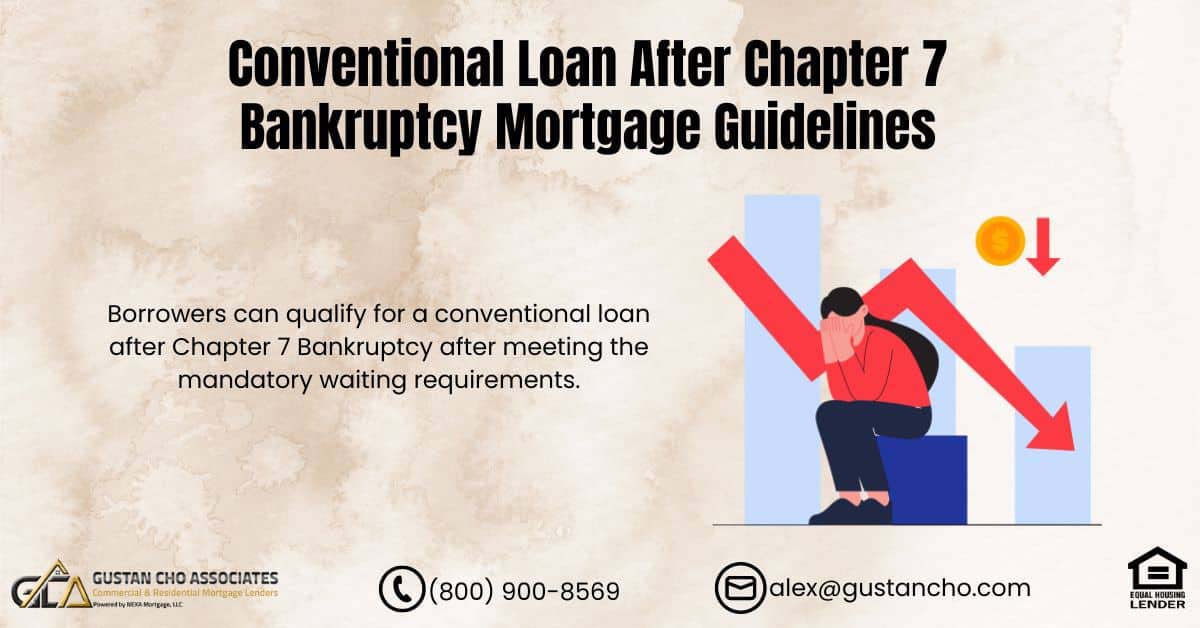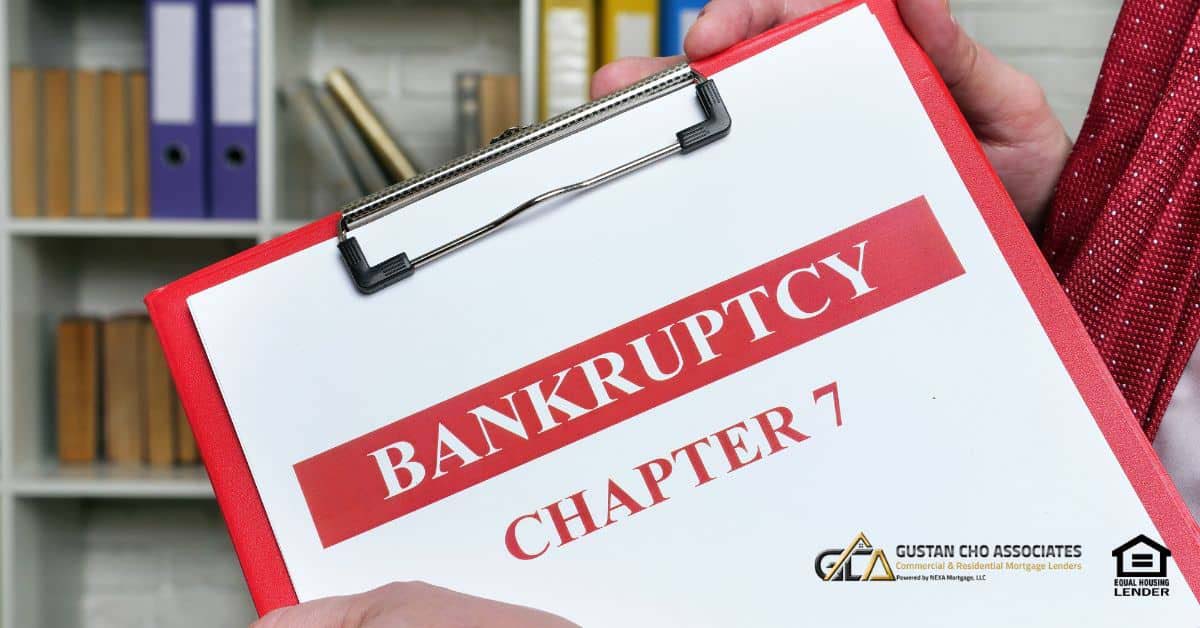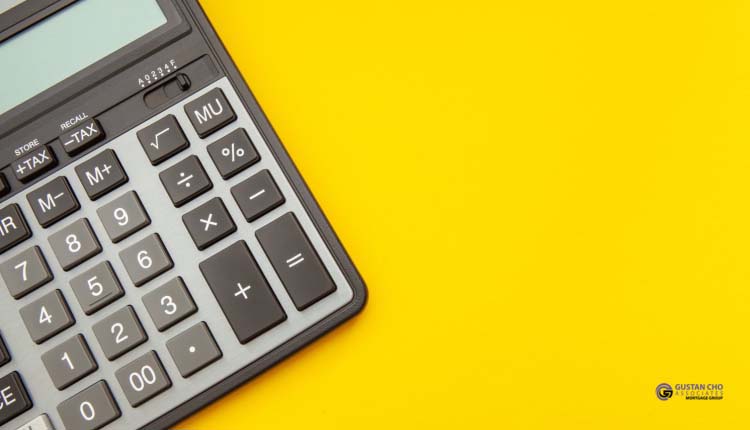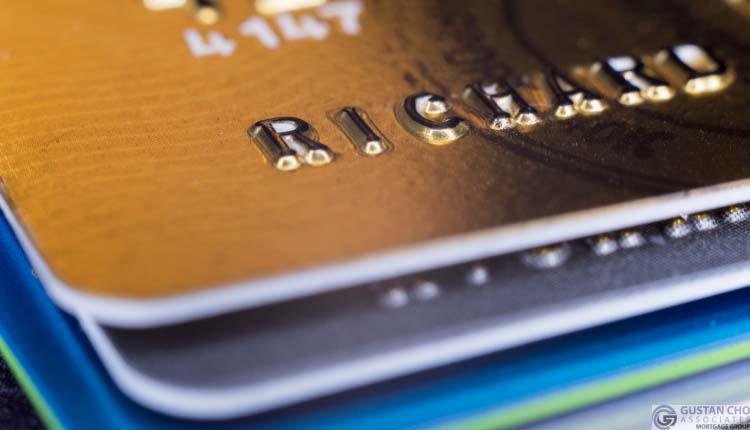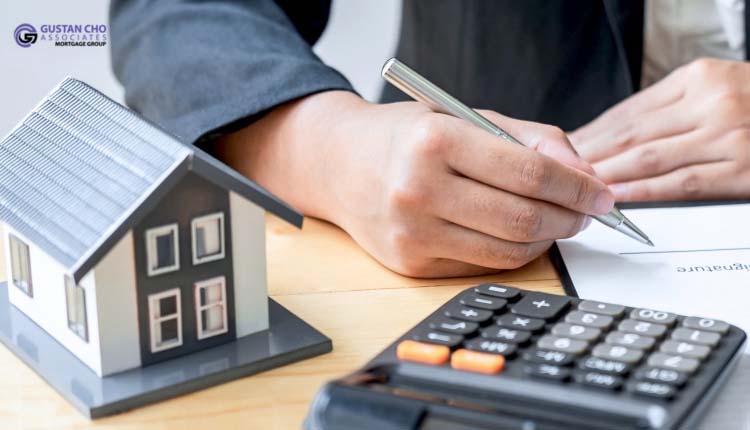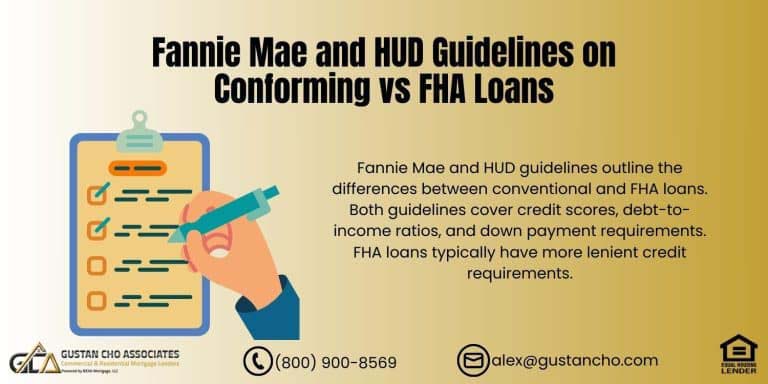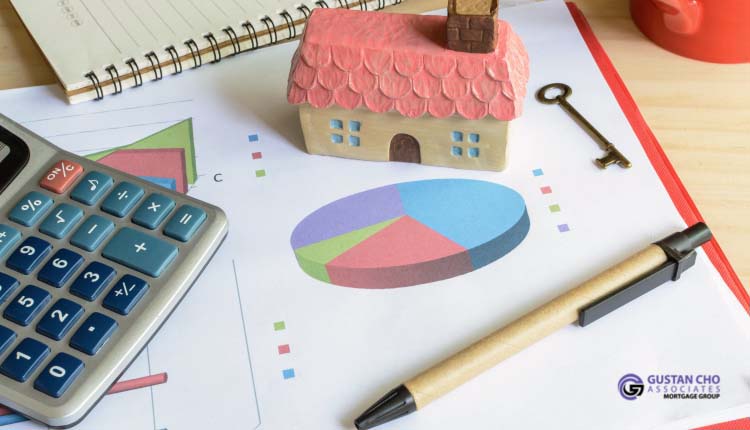There’s a common misconception that only those with excellent credit scores can secure a conventional loan, while FHA loans are reserved for borrowers with poorer credit. However, this belief needs to be revised. Both conventional and FHA loans operate under distinct lending guidelines.
Credit history, including past issues like bankruptcy or foreclosure, doesn’t directly affect mortgage rates for conventional and FHA loans. Factors like credit scores primarily determine mortgage rates, with higher scores resulting in lower rates.
Even with prior bad credit, borrowers can still qualify for both government and conventional loans. However, lenders typically require evidence of rebuilt credit and timely payments within the past year to secure approval through automated underwriting systems (AUS).
It’s important to note that bankruptcy doesn’t equate to bad credit. This discussion will explore the guidelines for obtaining a Conventional Loan After Chapter 7 Bankruptcy.
Talk to a Loan Officer About Getting a Conventional Loan After Chapter 7 Bankruptcy
Conventional Mortgage After Chapter 7 Bankruptcy
Bankruptcy, a federal law, provides consumers with a chance for a fresh financial start. Despite extenuating circumstances and significant debt, many Americans hesitate to file for bankruptcy, fearing it will ruin their chances of buying a house.
However, this assumption is incorrect. Filing for bankruptcy can lead to the opposite outcome. Gustan Cho Associates has assisted numerous borrowers in achieving credit scores over 700 after their bankruptcy discharge. They offer conventional loans after Chapter 7 bankruptcy with a 30% down payment, enabling individuals to rebuild their financial lives and pursue homeownership. Thus, a bankruptcy filing is the first step toward a fresh financial start.
What is the credit score 2 years after Chapter 7?
It typically takes up to two years for your credit score to recover after receiving a Chapter 7 bankruptcy discharge. However, you should start seeing improvement if you maintain responsible financial habits. Although there may be a significant initial drop, consistent efforts such as making on-time payments, keeping low credit card balances, and avoiding new debt can lead to gradual improvement.
Credit scores may vary, but diligent credit rebuilding can result in low to mid-600s or higher scores. Continuous monitoring of your credit and responsible credit usage are essential for ongoing improvement, particularly if you’re aiming for a conventional loan after Chapter 7 bankruptcy.
Importance of Rebuilding Credit After Bankruptcy To Get a Mortgage
There must be more than meeting the waiting period to secure a mortgage post-bankruptcy. Lenders require evidence of credit rebuilding and zero late payments post-bankruptcy, as any late payments are detrimental. Secured credit cards are crucial for credit repair, with Gustan Cho Associates specializing in this area.
Utilizing three to five secured cards and two credit rebuilder accounts can raise your score to 700 within a year of Chapter 7 Bankruptcy discharge.
Meeting waiting period requirements is mandatory to qualify for a conventional loan after Chapter 7 bankruptcy, but additional steps are necessary to ensure approval. Lenders insist on evidence of credit restoration post-bankruptcy. We will provide guidance and support to help you rebuild your credit after filing for bankruptcy so that you can meet the requirements set by lenders for mortgage approval.
Rebuilding And Re-Establishing Your Credit After Bankruptcy
Gustan Cho Associates has a proven method on how to boost your credit scores to over 700 FICO in just less than one year after the Chapter 7 Bankruptcy discharge date.
You do not need expensive credit repair companies to rebuild your credit after bankruptcy. The team at Gustan Cho Associates have helped thousands of consumers rebuild their credit after bankruptcy without charging anyone a dime. Whatever a credit repair company does, you can do it better at no cost.
The team at Gustan Cho Associates has helped thousands of folks rebuild and re-establish credit after bankruptcy and foreclosure. Gustan Cho Associates can help borrowers get a 700 credit score in just less than one year after the Chapter 7 Bankruptcy discharge date.
Preparing To Get Qualified And Pre-Approved
Homebuyers who purchase a home soon should engage a loan officer and initiate preparations to qualify for a mortgage. Those with a previous bankruptcy can indeed qualify for a home mortgage post-bankruptcy. Both government and conventional loans are accessible to mortgage borrowers after bankruptcy or foreclosure.
However, meeting mandatory waiting period requirements is essential for obtaining a conventional loan after bankruptcy. This article will focus on qualifying for a conventional loan after Chapter 7 bankruptcy.
How Can I Qualify For A Conventional Loan After Chapter 7 Bankruptcy
To be eligible for a conventional loan after Chapter 7 bankruptcy, borrowers must wait four years following the discharge date. There are specific waiting periods depending on the type of bankruptcy filed: two years for Chapter 13 bankruptcy and four years for Chapter 13 bankruptcy. Approval/eligibility per Automated Underwriting System (AUS) is necessary to qualify for a conventional loan. Alongside the mandatory waiting period, borrowers must fulfill the following criteria:
- Re-establish credit post-bankruptcy.
- Maintain a clean payment record with no late payments post-Chapter 7 bankruptcy.
- Keep the debt-to-income ratio below 50%.
- Provide a down payment of 3% to 5% for conventional loans.
- Maintain a minimum credit score of 620 FICO for conventional loans.
Can I Buy A House After Bankruptcy?
With the above, Fannie Mae’s and/or Freddie Mac’s Automated Underwriting System will most likely approve borrowers for a conventional loan after Chapter 7 bankruptcy with a four-year waiting period. However, if borrowers have the following:
- Lower credit scores
- Little to no reserves
- Late payments after bankruptcy
- No compensating factors
If borrowers have the above, then the chances are that borrower will not get an approve/eligible per DU or LP FINDINGS:
- It is extremely important that mortgage borrowers re-establish credit
- Make sure not to have any late payments after the bankruptcy discharged date
- Monitor your credit report like you monitor your bank account
Keep all your credit utilization at below 10% utilization for maximum credit score optimization.
What to do After Chapter 7 Discharge?
After receiving a Chapter 7 discharge in bankruptcy, there are several steps you can take to rebuild your financial health and move forward:
- Assess your finances.
- Create a budget.
- Rebuild credit with secured cards or loans.
- Monitor credit reports for accuracy.
- Avoid new debt and live within your means.
- Seek financial education.
- Stay organized with paperwork.
- Stay patient and positive.
- Seek professional advice if needed.
Waiting Period For Conventional Loan After Chapter 7 Bankruptcy
In certain circumstances, homebuyers may opt for a conventional loan over an FHA-insured mortgage due to differences in lending guidelines. While HUD offers more lenient guidelines, conventional loan programs have stricter criteria.
For those seeking a conventional loan after Chapter 7 bankruptcy, the waiting period is typically four years, compared to two years for an FHA loan. However, some lenders may impose longer waiting periods based on their specific overlays. Lenders without overlays rely on the Automated Underwriting System (AUS) for decision-making.
Qualification for a conventional loan post-Chapter 7 bankruptcy is determined by the Automated Underwriting System, which assesses the applicant’s overall financial strength.
How Does The Automated Underwriting System Work
The Automated Underwriting System will analyze the borrower:
- AUS will see if he or she has re-established credit
- Whether they have any late payments after the bankruptcy discharge
- Credit debt to income ratios
- Overall credit history
- Income, reserves
- Other credit and asset factors
FHA Versus Conventional Loan After Chapter 7 Bankruptcy Guidelines
To qualify for a 3.5% down payment purchase FHA insured mortgage loan, the mortgage applicant needs a 580 FICO score. HUD, the parent of FHA, allows borrowers with under 580 credit scores and down to a 500 FICO to qualify for an FHA loan with an approve/eligible per AUS and a 10% versus a 3.5% down payment.
To qualify for a 5% down payment home purchase conventional loan, the mortgage loan applicant needs a minimum of a 620 FICO credit score. If a home buyer is set on purchasing a condominium that is not FHA approved, then the home buyer needs to go through the conventional mortgage loan route.
Also, there are now new 2023 FHA mortgage lending limits that are now in effect. In most counties throughout the country, HUD now sets the maximum loan limits in 2023 at $427,030 unless the property is located in a high-cost county area.
2023 FHA’s maximum loan limit is $427,030 due to rising home prices. The Federal Housing Finance Agency (FHFA) has increased conforming loan limits for 2023 to $726,200.
Pre-Qualify for an FHA Loan Today
HUD And The FHFA Increase Loan Limits Due To Skyrocketing Home Prices
Both HUD and the Federal Housing Finance Agency have increased FHA and Conforming Loan Limits for 2022 due to rising home prices:
- HUD Increased The FHA Loan Limits for the past five years in a row due to skyrocketing home prices
- Conventional loan limits are capped at $647,200 unless the property is located in a high-cost county area
- The high balance FHA loan limit on a single-family home is capped at $970,800
- Any FHA loan that is greater than $647,200 is called high balance FHA loans or Jumbo FHA Loans
- For those homebuyers who need a mortgage loan greater than $420,680 and up to $647,200, then the home buyer needs to go through the conventional mortgage loan route
In most cases, you can go up to a 50% debt to income ratio on conventional loans.
Second Homes, Vacation Homes, Investment Homes
For home buyers interested in second homes, vacation homes, or investment properties, conventional loans after Chapter 7 bankruptcy are the primary option.
Four years is required after filing for Chapter 7 Bankruptcy to be eligible for Conventional Loans. Following Chapter 13 Bankruptcy, there’s a two-year waiting period from the discharge date for conventional loan eligibility. However, if the Chapter 13 Bankruptcy were dismissed, the waiting period would be extended to four years for conforming loans. It’s important to note that FHA loans are strictly for owner-occupied primary residences.
Conventional loans remain the preferred choice for those seeking financing for second homes or investment properties. A minimum down payment of 10% is required to qualify for a vacation or second home. The minimum down payment for investment properties is 15%.
However, if rental income is to be considered for qualification, a 25% down payment is needed. In such cases, 75% of the market rent is used as income for qualification purposes.
Conventional Loan After Chapter 7 Bankruptcy With Prior Mortgage Included In Bankruptcy
For individuals who included a mortgage in their Chapter 7 Bankruptcy, there’s typically a four-year waiting period to be eligible for conventional loans after the discharge date. However, the timing of the housing event matters:
- Whether it’s a short sale,
- Foreclosure, or
- Deed in Lieu of Foreclosure.
For instance, if a borrower included a mortgage in Chapter 7 Bankruptcy four years ago but the foreclosure was only finalized recently, they can still qualify for a conventional loan:
- The foreclosure, deed in lieu of foreclosure or short sale date doesn’t impact eligibility as long as the mortgage was part of the bankruptcy.
- This differs for government loans like FHA, VA, and USDA Loans, where the waiting period starts from the short sale or recorded foreclosure/deed in lieu of foreclosure date.
So, for conventional loan after Chapter 7 bankruptcy, the waiting period starts from the discharge date, not the housing event date.
Qualifying For A Mortgage With A Lender With No Lender Overlays
To qualify for conventional or government loans, especially for home buyers seeking a conventional loan after Chapter 7 bankruptcy with no lender overlays, please contact us at Gustan Cho Associates. You can call us at 800-900-8569 or text for a quicker response. Alternatively, you can email us at gcho@gustancho.com. Our team assists you 7 days a week, including evenings, weekends, and holidays.
The Two Types Of Consumer Bankruptcies
Consumer bankruptcies generally fall into two main categories: Chapter 7 and Chapter 13.
Chapter 7 bankruptcy, known as “liquidation bankruptcy,” requires the sale of assets that are not exempt in order to pay off creditors. Individuals with limited income and assets typically pursue it. Most debts are discharged through Chapter 7, providing relief from overwhelming financial burdens, except for government debts, child support, alimony, student loans, and tax liabilities.
Chapter 13 bankruptcy, also known as “reorganization bankruptcy,” involves creating a plan to repay debts over three to five years. It’s ideal for people with a regular income who want to keep their possessions and catch up on missed payments, such as mortgage or car loan arrears.
When considering eligibility for a conventional loan after Chapter 7 bankruptcy, it’s important to understand the differences between Chapter 7 and Chapter 13 bankruptcy.
What Are The Waiting Period To Qualify For Mortgage Loan After Bankruptcy
For those who have recently filed Chapter 7 bankruptcy and want to be homeowners, there is a mandatory 2 year waiting period from the discharge date of the bankruptcy in order for them to qualify for an FHA and VA Loan:
Those who have just filed for bankruptcy should immediately start re-establishing their credit and try to improve their credit scores. A bankruptcy can drop a person’s credit score by more than 150 points.
The good news is that the person’s credit score will improve as months passes. Many folks who have filed bankruptcies have credit scores north of 700 after two years. This is because they consciously worked on repairing their credit and credit scores from the day they filed for bankruptcy. Remember that you get a fresh start after filing for bankruptcy. Debt collectors can no longer come after you and all judgments on your record are null and void.
Chapter 13 Debt Restructuring Bankruptcy
Those who have assets and a job probably would be advised to file Chapter 13 bankruptcy. A Chapter 13 bankruptcy is a reorganization plan where a bankruptcy trustee is appointed to you. Your trustee will look at your gross monthly income and will take a portion of that and allocate it to your creditors.
Most Chapter 13 reorganization payment plans last 60 months before all debts are completely discharged. Those who have filed Chapter 13 bankruptcy, they are eligible to purchase a home via residential loan after one year into the Chapter 13 bankruptcy.
They would need the trustee’s approval. Most folks get approved by the bankruptcy courts for a home purchase because many times, a home purchase mortgage loan is less than the monthly rental payments.
Mortgage Loan After Chapter 13 Bankruptcy
Like those folks who filed Chapter 7 bankruptcy, those who filed Chapter 13 bankruptcy should start repairing and rebuilding their credit as soon as they file bankruptcy. They should be always paid their monthly bills on time and try never to be late with any payments. Many lenders frown upon those who have late payments after a bankruptcy and often times reject them for a mortgage loan.
Get a Mortgage Loan While in Chapter 13 Bankruptcy
Mortgage Guidelines After Bankruptcy and Housing Event
Here are the mortgage guidelines after bankruptcy and/or housing event:
- There is a two-year waiting period after a Chapter 7 Bankruptcy discharged date to qualify for FHA and VA loans
- There is a three-year waiting period after Chapter 7 Bankruptcy, foreclosure deed in lieu of foreclosure, short sale to qualify for USDA loans
- There is a two-year waiting period to qualify for VA loans after Chapter 7 Bankruptcy discharged date, foreclosure, deed in lieu of foreclosure, short sale
- There is a four-year waiting period to qualify for Conventional loans after a deed in lieu of foreclosure and/or short sale
- There is a seven-year waiting period to qualify for a Conventional loan after a regular foreclosure
- There is no waiting period requirement after Chapter 13 Bankruptcy discharge date on VA and FHA loans
- Borrowers can qualify for FHA and VA loans during Chapter 13 Bankruptcy Repayment Plan with Trustee Approval and Manual Underwriting
- There is a two-year waiting period after the Chapter 13 Bankruptcy discharged date to qualify for Conventional loans
- There is a four-year waiting period after Chapter 13 Bankruptcy dismissal date to qualify for Conventional loans
Non-QM Loans do not require any waiting period after bankruptcy, foreclosure, deed in lieu of foreclosure, short sale. For more information on this blog on conventional loan after Chapter 7 Bankruptcy or other mortgage topics, please contact us at Gustan Cho Associates at 800-900-8569 or text us for a faster response. Or email us at alex@gustancho.com.
FAQs About Conventional Loan After Chapter 7 Bankruptcy Mortgage Guidelines
1. How does filing for bankruptcy affect my eligibility for conventional loans? Filing for bankruptcy, particularly Chapter 7, doesn’t necessarily disqualify you from obtaining a conventional loan. However, you must meet waiting period requirements and criteria to qualify.
2. What are the waiting period requirements for conventional loans after Chapter 7 bankruptcy? For conventional loans, you typically need to wait four years from the discharge date of your Chapter 7 bankruptcy before you can qualify. The waiting period guarantees that you have had enough time to reconstruct your credit and display financial prudence after your bankruptcy.
3. What are the steps to qualify for a conventional loan after Chapter 7 bankruptcy? To improve your likelihood of meeting the requirements for a conventional loan following Chapter 7 bankruptcy, concentrate on reestablishing your credit, upholding a flawless payment history, maintaining a low debt-to-income ratio, and accumulating savings for a down payment ranging from 3% to 5%.
4. Can I apply for a conventional loan after including a mortgage in my Chapter 7 bankruptcy? It is possible to be eligible for a conventional loan, including a mortgage, even if you have filed for Chapter 7 bankruptcy. The waiting period generally commences from the date of your bankruptcy discharge and not from the date of the housing event, such as a foreclosure or short sale.
5. Are there alternatives to conventional loans for homebuyers with a bankruptcy history? You may consider government-backed loans like FHA or VA loans if you cannot qualify for a conventional loan due to a bankruptcy history. Unlike conventional loans, these programs usually have shorter waiting periods and less strict credit requirements.
6. How can I expedite the credit rebuilding process after Chapter 7 bankruptcy? To rebuild your credit quickly after Chapter 7 bankruptcy, focus on making on-time payments, keeping your credit utilization low, and diversifying your credit accounts. Use secured credit cards or credit builder loans to establish a positive payment history.
7. Can I get pre-approved for a conventional loan after Chapter 7 bankruptcy? You can still get pre-approved for a conventional loan after Chapter 7 bankruptcy. However, working with a lender who understands your situation and can guide you through the pre-approval process based on your financial circumstances and goals is essential.
8. What are the key factors lenders consider when approving a conventional loan after Chapter 7 bankruptcy? Lenders typically assess your credit history, payment record post-bankruptcy, debt-to-income ratio, down payment amount, and overall financial stability when considering your eligibility for a conventional loan after Chapter 7 bankruptcy. Meeting these criteria increases your chances of approval.
Call Us Today to Get Pre-Qualified for a Conventional Loan
Related> Waiting Period After Bankruptcy And Foreclosure Related> Qualifying For Mortgage After Bankruptcy And Foreclosure
This blog about Conventional Loan After Chapter 7 Bankruptcy Mortgage Guidelines was updated on March 15, 2024.


